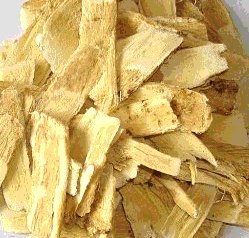Astragalus

  | Astragalus in TCM:Explore the properties of Astragalus according to Chinese
Nutrition and Traditional Chinese Medicine (TCM):
Temperature: warm
Channels: LU, SP
Flavors: sweet
Tonifies: qi
Astragalus, Radix Astragali Membranacei, is a widely used herb in Chinese medicine known as Huang Qi. Huang Qi is also listed under Chinese Herbs section of this site.
Astragalus is native to China and has been used for centuries in traditional Chinese medicine. The herb gained popularity in the USA during the 1980s. There are over 2,000 species of astragalus, but the two related species Astragalus membranaceus and Astragalus mongholicus are the ones primarily used for health purposes.
Astragalus is widely used in China for chronic hepatitis and as an adjunctive therapy for cancer. Astragalus has been used in traditional Chinese medicine, usually in combination with other herbs, to support and enhance immune function. It is also used as a folk or traditional remedy for colds and upper respiratory infections, and for heart disease.
The roots of the astragalus plant are typically used in soups, teas, extracts, or capsules. Astragalus is generally used in combination with other herbs, such as ginseng, angelica, and licorice.
Warnings / Contraindications:
Although astragalus is considered safe for most adults, its possible side effects are not well known. You should always consult your TCM practitioner before combining astragalus with other herbs.
Astragalus may interact with medications that suppress the immune system, such as the drug cyclophosphamide taken by cancer patients. It may also affect blood sugar levels and alter blood pressure.
Disclaimer: In accordance with our terms of service, by using this web site you agree that none of the information found on this web site constitutes medical advice. You should always consult your doctor before trying any particular food or herbal remedy to treat disease.
Folk remedies presented on this site are designed to address specifc TCM diagnoses, and are not one-size-fits-all. If you would like to learn more about Traditional Chinese Medicine (TCM) and how it relates to Chinese Nutrition, you can book in a free call with a licensed professional. There is no obligation to purchase.
[CLICK HERE for your free INITIAL CONSULTATION] |

